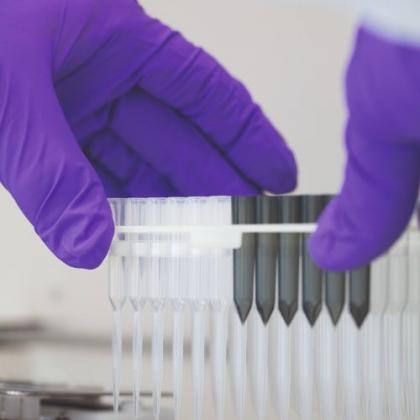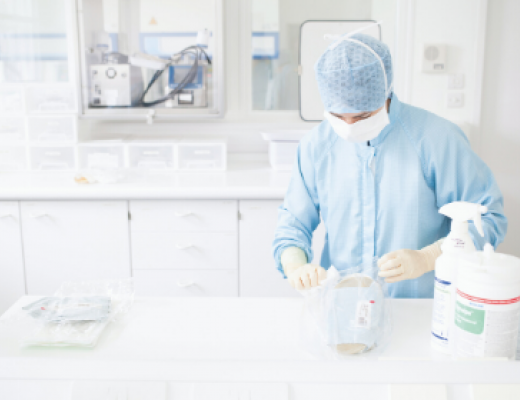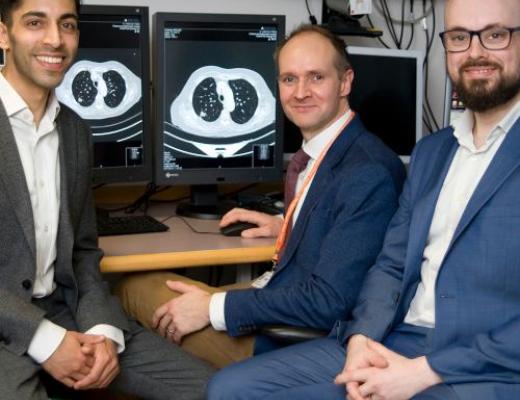Thanks to a generous donation from The Henry Oldfield Trust, The Royal Marsden Cancer Charity will be funding critical research during the COVID-19 pandemic. The Royal Marsden will build on world leading expertise into liquid biopsies to support prompt cancer diagnosis and treatment despite the diagnostic capacity constraints in place during to the COVID 19 pandemic.
The Royal Marsden and ICR have launched several critical research studies such as this at unprecedented speed, with The Royal Marsden Cancer Charity now raising over £500,000 over the coming weeks to ensure support for the research studies can continue.
Replacing invasive tissue biopsies
A pilot study for patients presenting with symptoms of pancreatic, lung, bladder, colorectal cancers and GISTs – a type of tumour in the gastrointestinal tract - will aim to replace invasive tissue biopsies with a liquid biopsy. A liquid biopsy can detect tiny amounts of cancer in the blood (circulating tumour DNA or ctDNA).
The PREVAIL-ctDNA study may give clinicians important information to use alongside cancer risk assessment of patients’ routine diagnostic scans, other blood tests, symptoms and medical history to appropriately prioritise and personalise cancer treatment (surgery, radiotherapy, drug therapy). The study is linked to PREVAIL-imaging where a refined scoring system is used to assess cancer risk on routine scans.

The number of invasive biopsies through camera tests into the body usually performed for these patients have dramatically fallen during the pandemic. This is partly due to re-directing resource to tackle the pandemic but also as these tests can produce an aerosol containing the virus from infected patients, risks infecting staff in the room, contamination of the diagnostic suite and infection of other patients.
During the recovery phase diagnostic services will continue to be under pressure as hospitals manage backlogs of tests. As patients start to come forward again for tests, stringent COVID 19 infection control may increase the time per patient.
Transforming our approach to cancer diagnosis and treatment
Dr Naureen Starling, Consultant Medical Oncologist at The Royal Marsden and Honorary Clinical Senior Lecturer at the Institute of Cancer Research, and study co-ordinating investigator said: “The potential to replace tissue biopsies with a liquid biopsy in some cancers and for some patients could transform our approach to cancer diagnosis and treatment, free up diagnostic capacity and could be a game changer for some of these tumour types in the future.
“For example, pancreatic tumour can be located in intricate places making it difficult to get a biopsy, so if liquid biopsies can prove to be a good alternative for some patients it could enhance our diagnostics abilities in the future.”
The Royal Marsden and its academic partner The Institute of Cancer Research have been at the forefront of liquid biopsy research in the past five years, most notably in breast cancer patients. The laboratory team led by Dr Mike Hubank in the NIHR funded Centre for Molecular Pathology has more recently designed liquid biopsy tests for paediatric and colorectal cancer that can also be used for the cancers in the PREVAIL ctDNA Pilot Study.
Major long-term benefits for patients
Professor Sanjay Popat, Consultant Thoracic Medical Oncologist at The Royal Marsden, and study co-investigator said:
“The liquid biopsy can identify genetic mutations in the patients’ tumour meaning that for some cancers such a lung cancer we can use one test as a cancer diagnostic and also to personalise targeted drug treatment from the start. The long-term benefits for liquid biopsy testing are major as to how we treat these patients’ post COVID 19 pandemic.”
The study will also be supported by the NIHR Biomedical Research Centre at The Royal Marsden and Institute of Cancer Research, London.
Professor David Cunningham, Consultant Medical Oncologist at The Royal Marsden and Director of the NIHR Biomedical Research Centre at The Royal Marsden and Institute of Cancer Research said:
“We are uniquely placed to look at COVID-19 in a cancer setting, investigating the pandemic’s impact across a wide range of patients. These trials call upon our multidisciplinary expertise in areas such as systemic therapies, radiotherapy, circulating tumour DNA which is detectable in blood tests, surgery and holistic care.”
“Teams have been working at pace to establish studies that adhere to our usual rigorous protocol; each will have varying durations, with a focus on immediate impact through to longer term understanding of this novel virus. Importantly, with commercial, NHS and academic partners across the country, and thanks to fundraising from The Royal Marsden Cancer Charity and support from The NIHR Biomedical Research Centre we hope this research will have a national and international impact.”



